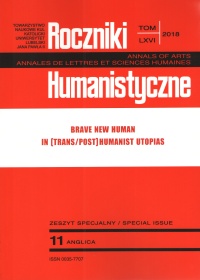Superhumans, Transhumans, and Posthumans in Early Modern Utopian Fiction
Abstract
The paper analyses the functioning of transhumanist and posthumanist motifs in Renaissance and Enlightenment utopias which invariably foreground the natural enhancement of human mental and physical capabilities not only by ideal social and political conditions, but also education, improved diet, healthy and moral lifestyle. New technologies and inventions may contribute to the comforts of life, but ultimately do not alter the traditional model of humanity. Occasionally introduced transhuman and posthuman creatures do not constitute models of the future development of humanity, functioning only as satirical elements, or as devices increasing the sensational appeal of the works in which they appear.
References
Anonymous. A True and Faithful Account of the Island of Veritas; Together with the Forms of Their Liturgy; and a Full Relation of the Religious Opinions of the Veritasians, as Delivered in Several Sermons Just Published in Veritas. London, 1790.
Anonymous. A Voyage to Cacklogallinia with a Description of the Religion, Policy, Customs and Manners of that Country. By Captain Samuel Brunt. London, 1727.
Anonymous. A Voyage to the World in the Centre of the Earth. London, 1755.
Anonymous. The Island of Content; or, A New Paradise Discovered. London, 1709.
Bacon, Francis, New Atlantis, in Susan Bruce (ed.), Three Early Modern Utopias. Thomas More: Utopia / Francis Bacon: New Atlantis / Henry Neville: The Isle of Pines. Oxford: Oxford University Press, 1999. 149—186. Print.
[Bannac, Adolphus]. The Life and Surprizing Adventures of Crusoe Richard Davis. London, 1756.
Barnes, Joshua, Gerania: A New Discovery of a Little sort of People Anciently Discoursed of, called Pygmies. London, 1675.
[Berington, Simon]. The Memoirs of Signor Guadentio di Lucca. Taken from his Confession and Examination before the Fathers of the Inquisition at Bologna in Italy. Making a Discovery of an Unknown Country in the Midst of the Vast Deserts of Africa, as Ancient, Populous, and Civilized, as the Chinese. With an Account of their Antiquity, Origine, Religion, Customs, Polity, &c. and the Manner how they got first over those vast Deserts. London, 1737.
Bostrom, Nick. “Letter from Utopia.” 2010: n. pag. Web.
Bostrom, Nick. “A History of Transhumanist Thought.” Journal of Evolution and Technology 14 (1) 2005. 1—25. Print.
Braidotti, Rosi. “Posthuman Critical Theory.” Critical Posthumanism and Planetary Futures. D. Banerji and M.R. Paranjape (eds.). New Delhi: Springer India, 2016. Print.
Cavendish, Margaret. The Description of a New World, Called the Blazing World. London, 1666.
Claeys, Gregory. Dystopia. A Natural History. Oxford: Oxford University Press, 2017. Print.
[Elliott, John]. The Travels of Hildebrand Bowman, Esquire, Into Carnovirria, Taupiniera, Olfactaria, and Auditante, in New-Zealand; in the Island of Bonhommica, and in the powerful Kingdom of Luxo-volupto, on the Great Southern Continent. London, 1778.
[Evans, Ambrose]. The Adventures and Surprizing Deliverances, of James Dubourdieu, and His Wife. London, 1719.
Gentleman, Francis. A trip to the Moon: Containing an Account of the Island of Noibla. Its Inhabitants, Religious and Political Customs. Newcastle upon Tyne, 1764.
[Godwin, Francis]. The Man in the Moone; or A Discourse of a Voyage Thither. By Domingo Gonsales. London, 1638.
Hauskeller, Michael. Mythologies of Transhumanism. Cham: Palgrave Macmillan, 2016. Print.
[Kirkby, John]. The Capacity and Extent of the Human Understanding. London, 1745.
L’Epy, M. Heliogenes de. A Voyage into Tartary. Containing a Curious Description of that Country, with part of Greece and Turky; the Manners, Opinions, and Religion of the Inhabitants therein; with some other Incidents. London, 1689.
[Lupton, Thomas]. Siuqila. Too Good, to be true: Omen. Though so at a vewe, Yet all that I tolde you, Is true, I upholde you: Now cease to aske why For I can not lye. Herein is shewed by waye of Dialogue, the wonderfull maners of the people of Mauqsun, with other talke not frivolous. London, 1580.
More, Thomas. Utopia, ed. Edward Surtz, S.J. and J.H. Hexter, Complete Works of St Thomas More, IV. New Haven, CT: Yale University Press, 1965. Print.
[Northmore, Thomas]. Memoirs of Planetes, or a Sketch of the Laws and Manners of Makar. London, 1795.
Paltock, Robert. The Life and Adventures of Peter Wilkins, A Cornish Man. London, 1751.
Roden, David. Posthuman Life. Philosophy on the Edge of the Human. Abingdon: Routledge, 2015. Print.
Swift, Jonathan. Gulliver’s Travels. Ed. Robert A. Greenberg. New York and London: Norton, 1970. Print.
Veiras, Denis. The History of the Sevarambians: A Utopian Novel. Ed. John Christian Laursen and Cyrus Masroori. Albany: State University of New York Press, 2006. Print.
Wolfe, Cary. What Is Poshumanism? Minneapolis, MN: University of Minnesota Press, 2010. Print.
Copyright (c) 2018 Roczniki Humanistyczne

This work is licensed under a Creative Commons Attribution-NonCommercial-NoDerivatives 4.0 International License.





